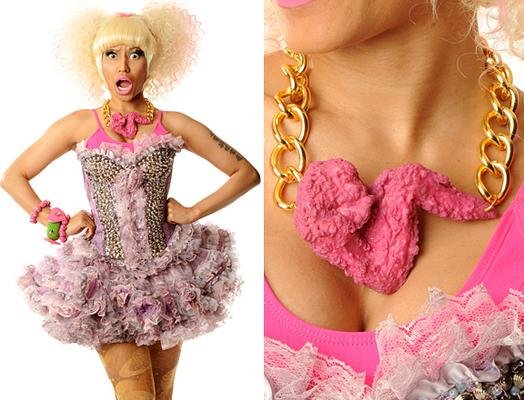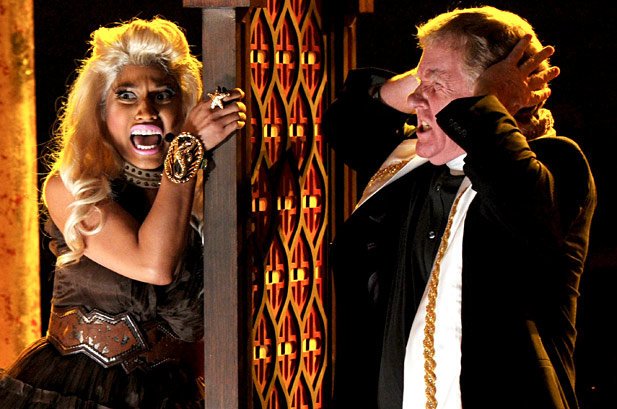Nicki Minaj, Roman Holiday, and Why the Culture Needs to Reevaluate Itself
If you've been on the Internet at all over the past few weeks, you've seen the rise of the latest viral meme: Nicki Minaj's 2012 track, "Roman Holiday." Twitter users have been using the track as the background to hilarious sped up videos of everything from dancing Simpsons' characters to cars speeding down the highway. The meme has proven to be the impetus for the track's sudden revival. As of this writing, "Roman Holiday" is currently is #57 on the U.S. iTunes charts (the highest charting female rap track) and has been a trending track on Apple Music for the past week.
The song's resurgence has been ironically timely for a few reasons. A little over a week ago, Nicki graced the MET Gala red carpet. The theme of this year's MET Gala was "Camp: Notes on Fashion" and many viewed this as easy path for Nicki to win the night. For most of her mainstream (and some of her indie) career, Nicki's artistry has been steeped in camp. She went to one of the most esteemed performing arts schools in New York (LaGuardia High School) as a drama major, which was apparent in many of the music videos for the Pink Friday album. Nicki's interpretation of camp varied from neon pink chicken wing necklaces and bizarre and garish red carpet garb to skits in her music videos and around ten different alter egos.
On "Roman Holiday," Nicki introduces and assumes the characters of Roman Zolanski, a gay boy who has been exiled to Russia for conversion therapy, and his mother, Martha Zolanksi. The song features lasers, orchestral elements, boom-bap influences, synths and more. Oh, and did I mention Nicki also interpolates "O Come All Ye Faithful," the classic Christmas hymn? Yes, "Roman Holiday" is the zeitgeist of camp in modern rap music. People expected Nicki to go full-throttle for the camp-themed MET Gala and are now (almost a decade later) professing their love for "Roman Holiday," but where was that love all those years ago?
Nicki Minaj was relentlessly bullied and ridiculed for the use of camp in her music and visual presentation. In fact, she was so torn down by the culture that was supposed to uplift her that she ended up dropping the alter egos and camp altogether by her third album, The Pinkprint. In retrospect, the response to Nicki's interpretation of camp versus the response to Gaga's interpretation (their debuts overlapped) of camp was disrespectful and, quite frankly, anti-black. Gaga wore similarly outrageous costumes and created similarly sonically ambitious songs. Remember that time Gaga hung her bloody body on stage during a performance of "Paparazzi" at the MTV Video Music Awards and was ranked the 4th best VMAs performance of all time (per Billboard)? Gaga's performance was interpreted as a commentary on the perils of fame as well as mental health and suicide awareness. Yet, with Nicki's performance of "Roman Holiday" at the Grammys. Her performance was not interpreted as a commentary on gay conversion therapy, horror noir, and the questionable ethics of the Catholic church like it could have been. Instead, Nicki's performance was branded as a "trainwreck" and the "#1 worst Grammy moment of the night" (per Idolator).
From a performance standpoint, both artists delivered solid showcases of their talent. The difference is, Nicki's camp was viewed as "ghetto" while Gaga's was viewed as "artistic." This is all a direct result of years of the racist notion that Black art is less valuable and important than its White counterpart. To return to the aforementioned chicken wing necklace, why wasn't it even given the chance to be interpreted as a commentary on Black stereotypes or an allusion to Ludacris' southern rap classic Chicken & Beer? Why was it completely disregarded as "absurd" and "ghetto" and not given any benefit of the doubt? Of course, there could be absolutely no artistic value to that necklace, but the fact that as a collective audience, we immediately discounted it (subconsciously because she was a Black woman) is problematic. Much of Nicki's camp is inherently rooted in Black culture, so she was already at disadvantage; back in 2012, Black culture wasn't as obviously influential as it is in 2019. Now, this is not to disregard the bullying that Gaga received for her wilder years, but at the end of the day there was still some level of respect for her artistry that Nicki was never granted. Of course, there are other elements at play here (traditionalist hip-hop culture, the risk of crossing genres, etc.) but this deserves a proper conversation.
The culture (Black culture and hip hop culture, specifically) needs to reevaluate itself. We must allow space for all people of the culture to be their full authentic selves and create art on their own terms. Furthermore, we must always appreciate that art, not just when White people or the larger culture tells us. Sure, Nicki is far from easily digestible; her music and persona are not for everyone. But after years of being bullied on a massive public scale, did we really expect Nicki to run back to her wig closet and pull out her alter egos that easily? Nevertheless, we should have uplifted her when she was pushing our boundaries and not just simply existing within those boundaries.


